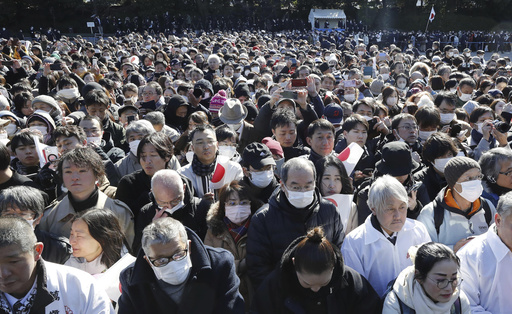
In a recent statement marking his 65th birthday, Emperor Naruhito of Japan underscored the critical importance of educating younger generations about the harrowing events of World War II. This year marks the 80th anniversary of the conflict’s conclusion, and in his remarks, he expressed a strong commitment to supporting historical education and fostering a lasting peace. “With the passage of time, it becomes increasingly essential that the tragic narratives of the war are conveyed to those who have no personal experience of it,” Naruhito remarked during a pre-recorded news conference released on Sunday.
The Emperor noted that many survivors of the war, who have endured significant hardships, are aging, creating a gap in firsthand accounts for the younger populace. Naruhito emphasized that the transition of their experiences and lessons is vital as these memories risk fading with time.
On his birthday, Naruhito, alongside Empress Masako, their daughter Princess Aiko, and family members, greeted well-wishers from the balcony of the palace. They were met with cheers from the gathered crowd, and a celebration was planned later in the day with a formal banquet at the palace.
The conflict that impacted Japan was particularly tied to his grandfather, Emperor Hirohito, who reigned during the war. Naruhito, along with his wife Masako—both born in the post-war era—has learned about wartime experiences and the fundamental message of peace through stories shared by their parents. His father, Akihito, who abdicated in 2019, was known for his commitment to addressing the past and reconciling with the consequences of the war, a path Naruhito intends to continue.
The Emperor’s sentiments align with the concerns of many survivors of the atomic bombings in Hiroshima and Nagasaki in 1945. These individuals, known as hibakusha, are increasingly apprehensive about the stagnant progress towards nuclear disarmament and the alarming rise in support for nuclear deterrent strategies. They aspire for greater recognition and awareness for their organization, Nihon Hidankyo, which has recently been awarded the Nobel Peace Prize for its extensive disarmament advocacy, hoping it will catalyze more interest among younger citizens.
Later this year, Naruhito and Masako are anticipated to visit the historical sites of Hiroshima, Nagasaki, and Okinawa, commemorating the lives lost during the atomic bomb attacks and honoring the heavy toll of one of the war’s most brutal battles. Their visit signifies an ongoing commitment to remembrance and an active stance toward promoting peace.

